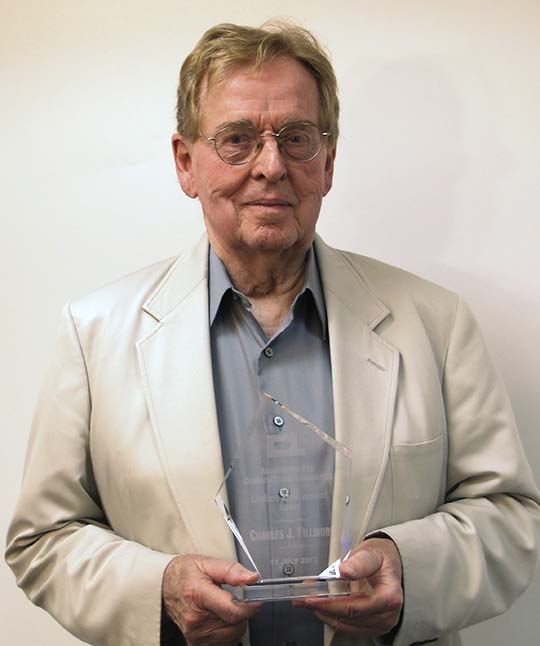FrameNet Director Charles Fillmore Receives ACL Lifetime Achievement Award
 July 11, 2012
July 11, 2012
Professor Charles Fillmore, director of ICSI's FrameNet Project, has received the Association for Computational Linguistics's Lifetime Achievement Award. The award, presented at the Annual Meeting of the ACL on July 11 in Jeju, South Korea, is given for widely recognized, sustained, and enduring contributions to the field of computational linguistics over a long period.
The FrameNet Project is based on the theory of frame semantics, which Fillmore developed in the 1970s. In frame semantics, words and phrases are understood through the situation types, such as "eating" or "removing," that they evoke. These situation types are schematically represented as frames. The FrameNet Project groups words according to their frames and describes the patterns in which they combine with other words and phrases. The project has annotated more than 150,000 sentences and defined more than 12,000 lexical units (a pairing of a word with a meaning), 8,000 of which have been annotated. FrameNet was established at ICSI in 1997 through funding from the National Science Foundation.
ICSI's new MetaNet Project, which is building a computer system capable of understanding metaphors used in four languages, will rely in part on work done by the FrameNet Project. Fillmore serves as an advisor on the project, which is funded by the Intelligence Advanced Research Projects Activity.
Fillmore has been and continues to be a major contributor to contemporary linguistics. In addition to frame semantics, Fillmore also developed case grammar theory in the 1970s. His work in collaboration with Paul Kay and George Lakoff was generalized into the theory of construction grammar.
The Lifetime Achievement Award is one of many honors Fillmore has received for his work in linguistics. In May, the European Language Resources Association presented Fillmore and Collin Baker, FrameNet's project manager, with the Antonio Zampolli Prize in recognition of their outstanding contributions to the advancement of language resources and language technology evaluation. They shared the prize with the Oriental Committee for the Co-Ordination and Standardisation of Speech Databases and Assessment Techniques. He holds an honorary doctorate from the University of Chicago and is a fellow of the American Academy of Arts and Sciences. He has served as president of the Linguistic Society of America and is a professor emeritus of linguistics at UC Berkeley.
